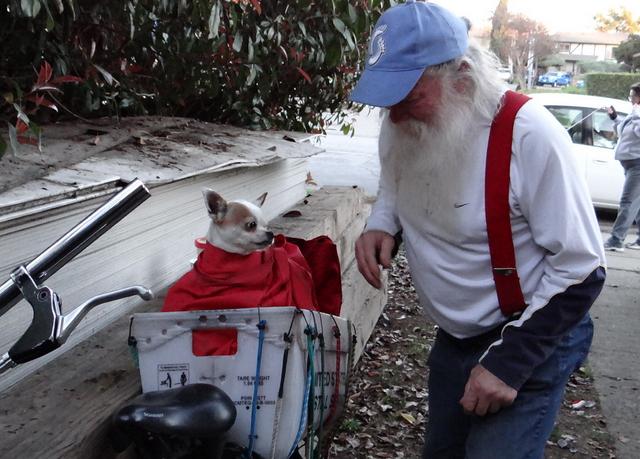 My homeless brother, his dog and his bike.
My homeless brother, his dog and his bike.Wouldn't it be nice if the homeless could just disappear and we could pretend they don't exist? Or that we, as a society, should not consider them citizens with any rights or anything of value to offer?
It is cold and I worry about Norman being on the ground somewhere during freezing weather. He belongs to a church where he can plug-in his phone and charge it every day and he calls me about every two weeks or so. He doesn't often complain, but his last call was a complaint. San Leandro no longer deals with the homeless. They've hired a company to do it for them.
Norman had been living near a freeway overpass with his tent and belongings hidden in some bushes next to the freeway. An ex-parolee, with jail tattoos found his camp and told him he had to move. Norman picked up his phone, backed up and said "By what authority, sir?" He answered he was being paid by a private company. "What is the name of the company sir?" The guy said he didn't have to tell him but if he didn't move, he'd call the police, and he left.
The ex-parolee, (Norman's assessment of the guy) returned with the police. Norman was arrested for trespassing and held for 9 days in jail. The ex-parolee confiscated his tent, his stove, his phone charger, his letter writing materials, a small file cabinet, his clothing, is bike, everything he owned except what he held in his hand-his phone. The company took his stuff, gave him a receipt that told him where it would be stored. He could pick up his belongings from the storage center and pay the fees; something he can't do without his bike. He had two weeks to pick it up. He didn't keep the receipt because he knew he couldn't get his stuff back before he could find another place to put it.
The stove, of course is the big issue, even though it is just a pot dug into the ground with rocks surrounding it. He cooks with paper and twigs and charcoal. It is a fire danger.
Why is it that a dog can pee on a tree in a park, and defecate in public, but a homeless human is not allowed to stop there for a nap? The homeless are dirty and smelly and look unsavory. He isn't allowed to physically stand in any public place or find a place to sleep. Out, out black spot.
And, now Norman is without his sleeping bag, tarp and a change of clothing. What a way to treat other humans, no matter what brought them to their current condition.
Norman gets social security because he worked and had a home most of his life. His income couldn't pay rent in the Bay Area. He must live in a city where there is public transportation and services.
But some states have learned that is far more cost-effective to offer cheap housing for the homeless than to grind them through the legal system and constantly hound them to go somewhere else.
What the conservative state of Utah learned:
The biggest group, 85 percent of the nation's 580,000 homeless are temporary, mainly men, but also women and whole families who spend relatively short periods of time in shelters or cars until they can get their life together, despite an economy stacked against them.
The remaining 15 percent, the chronically homeless, fill up the shelters night after night and spend a lot of time in emergency rooms and jail. Shelters have on average, 29 beds for every 100 homeless people. This costs roughly between $30,000 and $50,000 per person according to the Interagency Council on Homelessness. And, in extreme cases, like Reno's infamous Million Dollar Murphy, who cost the system-just one man- a million dollars. (Not figured into the average costs.)
The civil model for helping people is counseling, drug rehabilitation, programs to change behavior, medical treatment, but the homeless numbers keep going up and the treatments don't work. In Utah, in Salt Lake City, a guy by the name of Tsemberis thought, we've got schizophrenics, alcoholics, traumatized brain injured people; they can't even get into programs, they can't fill out complicated forms or applications. They can't get to therapy appointments regularly, or on time. Why not give them a place to live an assume they have a right to housing and health care. They ran a large test with 242 apartments. No questions asked. They have to promise they won't hurt anyone or bother their neighbors. They have a choice to take part in rehab or detox programs. The results were remarkable. After five years, 88 percent of them were still in their apartments and the cost for caring for them a little less than having them on the streets.
New York City tried providing housing for 4,679 severely, mentally impaired individuals who cost the city $40,449 a year. They save an average of $16,282 per person by providing them housing. Denver found emergency service costs in their Housing First program, saved $31,545 per person.
California is supposedly a liberal, innovative state. Why are we treating our homeless worse than before by making it impossible for them to be warm and secure, even with a tarp and a sleeping bag under a freeway overpass or in the bushes?
No comments:
Post a Comment